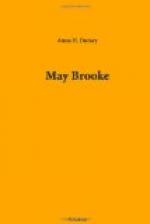“No; I only know that the commandments order us not to worship graven images,” he said, gruffly.
“You only say that, sir, for I am well assured that you believe no such monstrous thing. Oh no! no more than we worship the stars, which, in their sparkling beauty, lead our thoughts to God. In these sacred delineations we are reminded of our great examples, Jesus and Mary; they tell us better than books can do—better than our unfaithful hearts can, whenever our eyes rest on them, that for us the Divine Son and Immaculate Mother assumed the sin-offering of the world. These white hyacinths and violets are emblems of her purity and humility; and carved crucifix, the image of incarnate patience and undying love. Oh, dear Mr. Fielding, I should be worse than a pagan, if I did not keep these memorials of Jesus and Mary ever before me; if I did not let a shadow of my poor love for their infinite clemency and love express itself in veneration for those images which remind me continually of them.”
“I didn’t come here to talk polemics,” said Mr. Fielding, turning away abruptly, and sitting down.
“And will you please, most grave sir, to open the business which has procured me the honor of this visit?” said May, seating herself primly in a chair opposite to him, and folding her little hands together with an air of dignity. Mr. Fielding coughed, to hide a laugh.
“Where is Dr. Burrell?” he inquired.
“Attending to his patients, I presume,” she replied, while her face flushed up.
“So. When did your ladyship see him last?”
“I am not aware that it concerns you especially to know,” she said, confused.
“Yes it does. I have a right to know every thing about you per fas et nefas. Any one who will burn up a will, which would have secured to her a half million in funds and real estate, or, in case she did not burn the will, won’t consent to set one aside, which the testator declared on his death-bed was null and void; who refused to come and keep house for a childless old man, who would have treated her in every respect as an honored guest; who flew off like a fussy little wren, when her affluent cousin offered to provide for her; and who, last of all, rejects one of nature’s noblemen—the best match in the city—the deuce knows for what; I consider non compos mentis, and quite unable to take care of herself.”
May’s countenance was a study while Mr. Fielding poured out this vial of wrath on her head. Smiles, and tears, and blushes flitted in bright tides over it, making it very radiant and beautiful; but when he summed up the evidence, and the true cause of his ire burst on her, she laughed outright, with such a clear, merry peal, that Mr. Fielding was obliged to yield to its influence.
“You are an incorrigible little wretch, May! But tell me, soberly, why you rejected Dr. Burrell?”
“Simply, sir, because I have not the remotest idea of marrying; and if I had, I do not think I should find those sympathies, affinities, and qualities in Dr. Burrell which would secure my happiness.”




